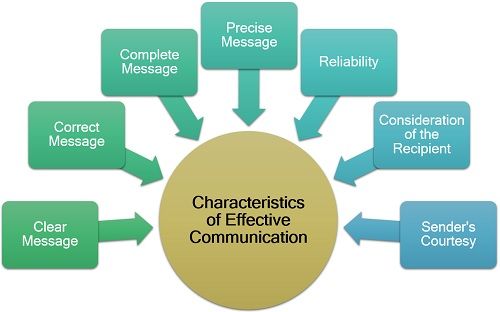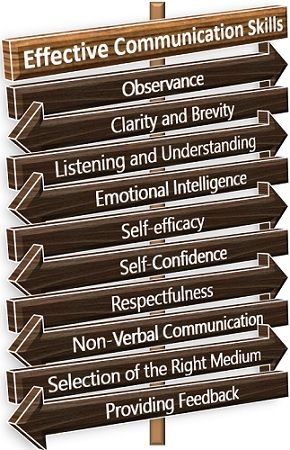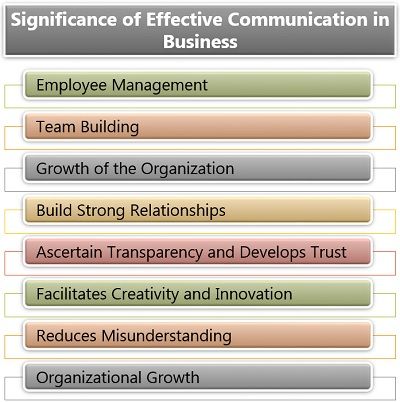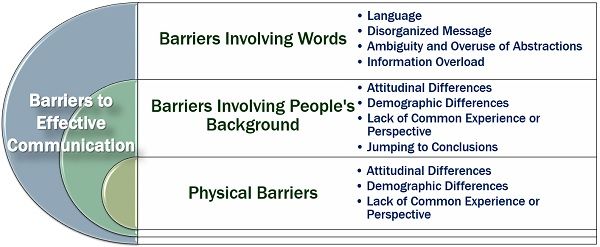Definition: Effective communication is a process of exchanging ideas, thoughts, knowledge and information such that the purpose or intention is fulfilled in the best possible manner. In simple words, it is nothing but the presentation of views by the sender in a way best understood by the receiver.
We can say that it generally involves;
Sender: The person who initiates the process of communication by sending a message;
Receiver: The one to whom the message is to be delivered.
Content: Effective Communication
Characteristics of Effective Communication
Just delivering a message is not enough; it must meet the purpose of the sender. Keeping this in mind, let us discuss the elements which make communication effective:
- Clear Message: The message which the sender wants to convey must be simple, easy to understand and systematically framed to retain its meaningfulness.
- Correct Message: The information communicated must not be vague or false in any sense; it must be free from errors and grammatical mistakes.
- Complete Message: Communication is the base for decision making. If the information is incomplete, it may lead to wrong decisions.
- Precise Message: The message sent must be short and concise to facilitate straightforward interpretation and take the desired steps.
- Reliability: The sender must be sure from his end that whatever he is conveying is right by his knowledge. Even the receiver must have trust on the sender and can rely on the message sent.
- Consideration of the Recipient: The medium of communication and other physical settings must be planned, keeping in mind the attitude, language, knowledge, education level and position of the receiver.
- Sender’s Courtesy: The message so drafted must reflect the sender’s courtesy, humbleness and respect towards the receiver.
Effective Communication Skills
Conveying a message effectively is an art as well as a skill developed after continuous practice and experience. The predetermined set of skills required for an influential communication process are as follows:
- Observance: A person must possess sharp observing skills to gain more and more knowledge and information.
- Clarity and Brevity: The message must be drafted in simple words, and it should be clear and precise to create the desired impact over the receiver.
- Listening and Understanding: The most crucial skill in a person is he must be a good, alert and patient listener. He must be able to understand and interpret the message well.
- Emotional Intelligence: A person must be emotionally aware and the ability to influence others from within.
- Self-Efficacy: Also, he/she must have faith in himself and his capabilities to achieve the objectives of communication.
- Self-Confidence: Being one of the essential communication skills, confidence enhances the worthiness of the message being delivered.
- Respectfulness: Delivering a message with courtesy and respecting the values, believes, opinions and ideas of the receiver is the essence of effective communication.
- Non-Verbal Communication: To connect with the receiver in a better way, the sender must involve the non-verbal means communication too. These include gestures, facial expressions, eye contact, postures, etc.
- Selection of the Right Medium: Choice of the correct medium for communication is also a skill. It is necessary to select an appropriate medium according to the situation, priority of the message, the receiver’s point of view, etc.
- Providing Feedback: Effective communication is always a two-way process. A person must take as well as give feedback to bring forward the other person’s perspective too.
Significance of Effective Communication in Business
You must be wondering, what is the role of effective communication in business? To answer this question, let us understand the following importance of effective business communication:
Employee Management: Effective communication ensures self-discipline and efficient management since the employees are heard by the top management, and there is open communication in the organisation.
Team Building: People in the organisation work as a team to accomplish common goals, thus effective communication boosts the morale of the whole team.
Growth of the Organization: It ensures better decision making, intensifies public relations and enhances problem-solving ability. All this leads to corporate growth and development.
Build Strong Relationships: Interactions often simplify things; they positively motivate the employees to perform better and maintain long-term relations with others in the organisation.
Ascertain Transparency and Develops Trust: Effective communication is considered to be a base for building trust and assures sharing of complete information.
Facilitates Creativity and Innovation: It creates an environment where employees are free to share their ideas by exploring their creative and innovative side.
Reduces Misunderstanding: Effective communication eliminates the possibility of confusion and misunderstanding by conveying the message clearly and appropriately.
Organisational Growth: By maintaining cordial relations between the employees and the management, it enhances the functioning and leads to the achievement of corporate goals and objectives.
Barriers to Effective Communication
There are certain obstacles which sometimes hinder the process of communication, making it less useful for the sender as well as the receiver. These barriers are categorised under three groups. Let us understand these in detail below:
Barriers Involving Words
Words play an essential role in the process of communication. Any disturbance or distraction in the way a message is presented may lead to miscommunication. Following are the different types of communication barriers related to words:
- Language: It is a medium of communication. If the sender is making excessive use of technical terms, it will become difficult for the receiver to understand the message clearly.
- Ambiguity and Overuse of Abstractions: Even if the message is presented in a non-realistic or vague context involving a lot of notions, the receiver won’t be able to connect with the idea properly.
- Disorganised Message: When the words are not organised systematically to form a powerful message, it loses its efficiency and meaning.
- Information Overload: The effectiveness of communication reduces when a person keeps on speaking for an extended period. Thus, leading to the receiver’s exhaustion, who won’t be able to keep track of everything that is conveyed.
Barriers Involving People’s Background
People belong to different backgrounds, i.e., culture, education level, gender, etc. These attributes majorly affect the efficiency of the communication process. It involves the following related obstacles:
- Attitudinal Differences: At times, people are resistant to understand or change their mind when they have set their views about a particular topic. Their attitude obstructs meeting the purpose of the communication.
- Demographic Differences: The difference in age, generation, gender, status, tradition, etc., creates a lack of understanding among people and thus, hinders the process of communication.
- Lack of Common Experience or Perspective: The experiences of a person develops their perspective of seeing things in a particular way. This perspective varies from person to person. Therefore, it becomes difficult for a receiver to relate with the sender’s experience or views as he might have never gone through it himself.
- Jumping to Conclusions: Some people lack the patience of listening to others and often jump to conclusions between the communication, thus neglecting the motive of the message.
Physical Barriers
These barriers can be experienced directly but challenging to overcome. These include:
- Physical Distance: When people communicate over long distances, they miss out the non-verbal aspect of communication, since the gestures and expressions of the receiver cannot be interpreted.
- Noise: The environment or the communication system sometimes involve unwanted noise which interrupts the process of communication making it inefficient.
- Physiological Barriers: One of the most common barriers to effective communication is the physical disability of the people involved. Some of these are hearing impairment, poor eyesight, stammering, etc.
Thus, we can say that the significant purpose of communication is to pass on the information to the receiver in such a manner that it does not lose its significance. At the same time, the message must be received in its purest form.
Ljusnan dal says
Good and relevant.
Anilkishore says
Relevant information about effective communication
Anjali says
It’s very useful
joseph KWAWU says
It is very useful, it helped me understand the relevance of communication.
Talal says
Very good article it helps in building a better communication skill. Thank you !!
Emad Qutran says
It is very helpful .
adoch martha says
effective communication is very relevant .
VeD says
Thanks you or sharing this infomation.
This is helping me a lot.
Jaya says
Beautiful article
Debbie says
Interesting & useful information
Emmaculate says
I love the content coz it’s well detailed and understandable…
Lamidi toheeb says
I really love this ✌️
buhle says
useful information
THapelo says
Very insughtful
MARIA says
very informative
Ronald says
Powerful 💪
maureen says
vital information
Mable Baguma says
Very useful content on effective communication. Applicable in All relationship s.
Chinonye Jane Claret Osuagwu says
Very true and helpful
Jemarie Baltazar says
It’s very useful and relevant
Khangwelo says
Very Informative piece
Dolly says
This was so helpful in my assignment 😊
Susan says
It is a very elaborate article
Naomi Sakwa says
Very helpful
alli odunola says
very insightful
Omperkash Sajnani says
It is simple to understand. I love and enjoyed it well.
Shazeda khatun says
Most important and relevant information
meba says
simple and effective to understand
Shikwi Dibetla says
Learnt that communication is key is all aspects of life
Nifemi Seun says
this is a masterpiece on communication
Alice says
Thank you 💞
Afije Joseph says
It’s really useful
Sylvester says
Simple and easy to understand. It really helped me understand effective communication
Zemenu Tadesse says
great
KACHUNGWA STELLA BIRUNGI says
I LIKE THE INFORMATION HERE, SO ARTICULATE AND EASY TO UNDERSTAND
Soni says
Thxs
Abeid says
It’s very good can help people to deliver good information depending on who is receiver of that message
TINDI EDWIN MARUTI says
I have really understood what effective communication really means in real life
Jane Esterhuizen says
Useful tips.
Patson Machila says
Very deep and the explanation leaves no questions in the mind of the reader. A very very good presentation!
Ebiere Kingsley says
very helpful
Catherine Canoy says
Helpful and easy to comprehend
Alice says
Its very insightful
Nonto says
This piece is so mind blowing and amazingly rich in knowledge.
Great work – You just realize there is a lot you still need to learn in life and in the workplace
GILBERT YUMBA 🇿🇲 says
Great insight – Effective Communications –
Masterpiece
barbara ofori appiah says
Learnt that communication is key is all aspects of life
Evelyn says
Most vital aspect of any interaction is communication.
nkosinathi Zwane says
very helful, communication is key
Shelley Warnock says
Great advice and understanding
Catherine Ringe says
great work here,answered my concern instantly